Birmingham council 'on track' to clear waste backlog
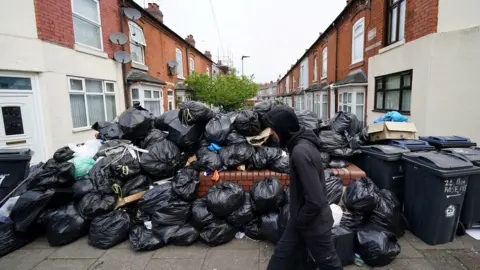 PA
PABirmingham City Council says it is on track to clear a backlog of uncollected waste by the weekend, despite the ongoing dispute with the Unite union.
Craig Cooper, strategic director of city operations, said collections would focus first on "the poorest parts" of the city "affected the most" by the ongoing bin strike.
Mr Cooper said the amount of uncollected waste had peaked at 22,000 tonnes, but he expected to be back to "one household collection every week" for all residents by the weekend.
Hundreds of bin workers began an all-out strike on 11 March, in a standoff with the Labour-run council that has led to bin bags and fly-tipped rubbish piling up on streets.
The city's residents are caught in the middle of the dispute, and many have told the BBC of their increasing frustrations, with one saying it "can't go on".
Striking workers held a rally on Tuesday morning, a day after Unite union members rejected the city council's latest pay offer.
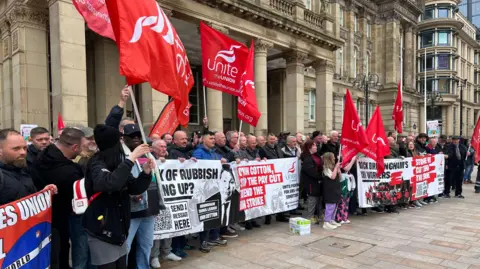
"We're already back to collecting normal household waste this week," Mr Cooper said. "We are back into a position of good control.
"The priority now is street cleansing and making sure the fly-tipping is at a manageable level."
He added that the council had 120 bin lorries out every day completing rounds, which was roughly half of its total capacity.
Garden waste and recycling will not be collected by the authority until the strike is over, he said.
Mr Cooper described it as "disappointing" that an agreement had not been reached with Unite and urged them to "come back to the table" to end the dispute.
More negotiations between the two sides are expected to take place on Wednesday.
The dispute centres around the council's decision to remove Waste Recycling and Collection Officer (WRCO) roles from some bin workers.
On Monday, workers voted to reject the council's latest offer, which Unite said was "totally inadequate" and also did not address potential pay cuts for 200 drivers.
A council spokesperson said the offer was fair and included options for affected workers.
But one of them, Jordan McNeill, a mother-of-two who came to Tuesday's rally, said workers were already on a low wage.
"I'm not going to be able to pay my bills, I'm not going to be able to do things for my children," said Ms McNeill.
"I'm just going to be living day by day, thinking 'where am I going to get my food from? Where am I going to get everything else from? Where am I going to get my children's clothes from?'
"I don't know what I'm supposed to do."
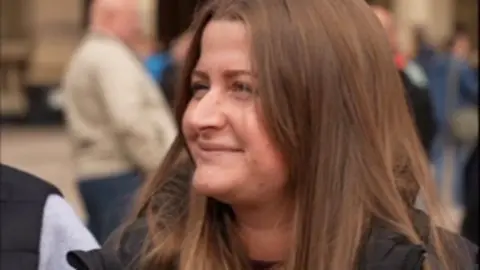
Tuesday's rally took place outside the Council House, home of Birmingham City Council, with dozens of Unite officials, bin workers and supporters attending.
There were cheers and loud horns from the crowd, who held up placards and flags.
Unite said a petition supporting the striking workers and containing 3,000 signatures was handed in during the event.

Many Brummies have stepped forward to help each other out during the strikes, with neighbours sharing trips to the tip and volunteer litter-pickers seeing their work increase.
"Where we can help people out, we should help out," said Haroon Hassan, who was collecting bin bags from residents and carrying them to a mobile waste centre in Small Heath on Tuesday.
"That's just being a good citizen, a good member of the community."
During the strike, the council has been running mobile collections where bin trucks park at a fixed location in a neighbourhood for a morning, so people can bring along their rubbish.
Mr Hassan told BBC Radio WM that the bin strike had been "very, very tough" for residents, especially with the weather getting warmer in recent weeks.
He said he was hopeful the two sides would soon find a solution, as "this sort of stuff can't go on forever".
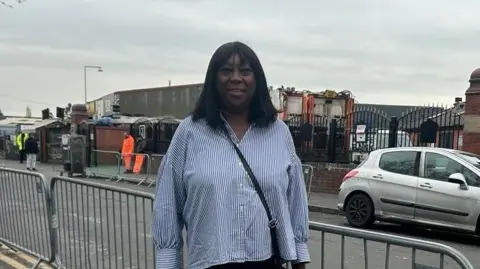
Violet Williams, a Small Heath resident who was using the waste centre, said she felt "awful" when she saw photos of bin bags piling up on the city's streets, which have made headlines around the world.
Ms Williams, who does not have a car, was dropping her rubbish off at the centre before taking a bus to collect more rubbish from her 92-year-old mother.
Bin workers at the rally stressed that they were not on strike in order to get a pay rise but in order to protect their existing roles and wages.
One of them, Maxine Stanley, said: "Once they say our wages [will be] left alone, we'll all go back to work. We're all Birmingham residents – my bins haven't been collected.
"But at the end of the day, we've got to stand firm against Birmingham City Council.
"I don't want Birmingham to look like this, I want it to be clean."
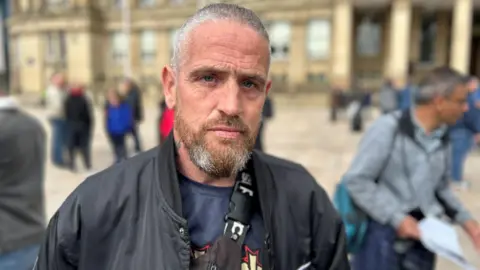
"Not one of the people you see standing here wants to be on strike," said Samuel Yates, who holds one of the WRCO roles that is at the centre of the dispute.
"We don't want a wage rise; we just want a fair pay for the fair day's work that we do."
Mr Yates said he stood to lose £6,200 per year from his salary on top of a £1,200 wage cut that he had already had to accept.
Many workers also said they did not like to see the city's streets in a poor state, but they felt they had to go on strike to protect their livelihoods.
"The majority of us don't just work in Birmingham; we actually live in Birmingham too, so we are Birmingham residents, and we're affected as much as the public are," said Steeven Biset.
As the strike rumbles on, national government ministers have also voiced concerns over the situation in the UK's second largest city.
"Our message, loud and clear, is that Unite needs to call off the strike, accept the deal, and let's get back to normal," industry minister Sarah Jones told BBC Breakfast on Tuesday.
The union said its workers were striking in order to prevent pay cuts, not in a bid to get more money than they currently receive.
"Our members would like nothing better than to be able to call off the strike and get back to work," Onay Kasab, Unite national lead officer, told BBC Breakfast.
"But as things stand, we still have people who are going to be facing huge pay cuts as a result of this."
Follow BBC Birmingham on BBC Sounds, Facebook, X and Instagram.
